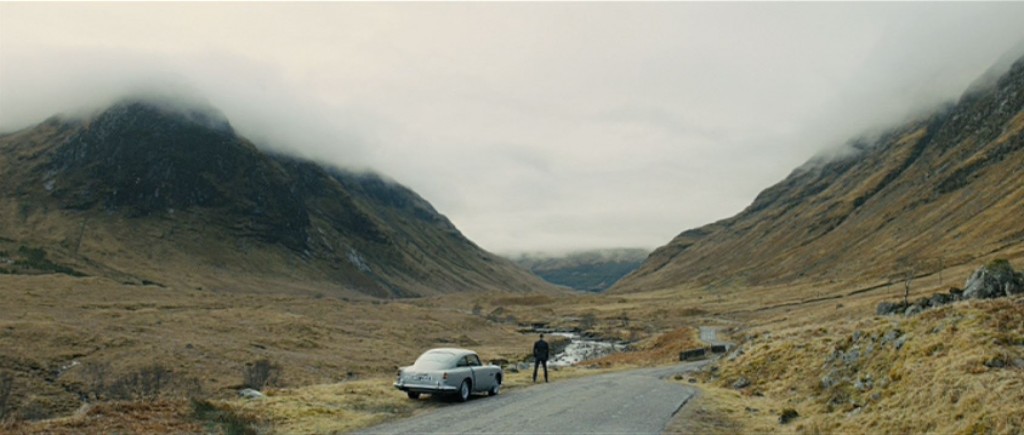James Bond: Skyfall part 8
Act IV of Skyfall begins at 1:45:49 and opens with a stunning shot of Bond, with his Goldfinger car, as a tiny figure in a huge landscape, fitting as Skyfall‘s primary goal is to place the Craig Bond in context, not just in the Bond-verse but in the cultural landscape. The narrative asks “How does James Bond fit into the modern world of espionage?” but what it’s really asking is how he fits into the modern world at all. And I don’t think I’m “bringing this” to the movie, I think it’s quite intentional. The Bond movies have never, ever seriously asked us to consider the world of real-life espionage at all, they’ve always been colorful, absurd, high-flown escapist spectacles, the Batman of espionage thrillers. They didn’t offer a solution to the Cold War, they offered escape from it, they goofed on it.
And so, as with Batman, Bond must now be re-imagined, brought to earth, scaled back and made a resonant character. I’m not a grade-A cultural analyst, but one thing I’ve noticed in the past decade is that everyone has an opinion on Bond, and must have an opinion on Bond, and must be prepared to discuss and defend those opinions, and must be prepared to offer logical reasons why they prefer Dalton to Brosnan or why The Spy Who Loved Me is better than Thunderball or why Nick Nack is better than Tee Hee, all in spite of the fact that it’s all quite silly. James Bond, for some bizarre reason, bless his heart, matters to us as a culture. He obviously means something.
I think the cultural shift regarding Bond is the same shift that has presented itself to straight white men everywhere: he’s no longer in charge of everything, and the world is no longer his red carpet. Watching You Only Live Twice the other day, I was struck by how the whole narrative just unrolls for Bond to step into. There’s a scene where Japanese super-spy Tiger Tanaka takes Bond to his gigantic Ninja Training Camp, an idea silly enough by itself, but sillier still is the way it’s presented to Bond: here is a gigantic ninja training camp, we are all here to help you, do what you like with us. Guns, gadgets, vehicles, women, travel are all thrust toward the Connery Bond with the flourish of a fruit basket in a penthouse suite for a VIP. “Right this way, Mr. Bond, your fantasy adventure awaits you for you to partake.”
With rare exceptions, the Bond movies are nothing but fantasy comedies for middle-aged men with adolescent minds (which is why Roger Moore kept being cast long past his sell-by date – Bond on paper may be a young man, but Moore was the audience). The typical Bond plot falls apart with only a cursory glance and has the visual panache of a 50s Batman story: giant props, garish villains, shark tanks, volcano strongholds, indestructible henchmen. In On Her Majesty’s Secret Service Bond leads a chase into a stock-car race and no one bats an eye. The climax of You Only Live Twice hinges on a self-destruct device called “The Exploder Button.” They are movies made to entertain Don Draper, and, lest we forget, Don Drapers used to run the world.
Now the president is a black man and Bond’s boss is a woman and the Bond brand of leering sexism and casual misogyny is repugnant and off-putting. That’s why the Craig Bond has been re-imagined, brilliantly, as an underdog, a shadow living in a shadow, a grown child who dreads a trip home: he can’t escape his past, he must go home — in order to burn it to the ground. In fact, we could say that the plot of Skyfall exists as an excuse for Bond to go home and destroy it, to shed his past. Like Silva, he wants to finally be his own man.
